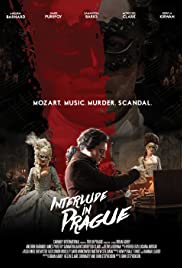
INTERLUDE IN PRAGUE
Czech Republic, 2017, 103 minutes, Colour.
Aeurin Barnard, James Purefoy, Morfydd Clark, Adrian Edmondson, Dervla Kirwan, Samantha Barks.
Directed by Brian Ashley, John Stephenson.
The interlude of the title is an episode where Wolfgang Amadeus Mozart visits the Czech capital and finds the inspiration to create the Opera, Don Giovanni. In fact, the screenplay is an imaginative fiction.
The setting is 1786, the popularity of Mozart’s music in Prague, performances of his operas. The person in charge of promoting Opera in the city is Baron Saloka, an arrogant figure, a sinister figure, unscrupulous, ruthless, womaniser. While his associates collect money to bring Mozart to Prague, he is unwilling but finally decides to bring the composer.
Mozart, played by and Aneurin Barnard, is young, creative, reacting against the severity of the Archbishop of Salzburg whom he has left. His baby son has died and his wife and surviving young son are at a spa to recover. He is feted in Prague (except by the Baron who snubs him), auditions singers and is attracted to a singer the Baron is interested in, Zuzanna (Morfydd Clark). Her parents (veterans Adrian Edmondson and Dervla Kirwan) rely on their daughter’s sense of duty and being prepared to marry the Baron.
With this portrait of the Baron and with Mozart’s attention to Zuzanna, there is a buildup to some unexpected melodrama and the behaviour of the Baron. Mozart continues his composing Don Giovanni even up to the last moment before performance, but it is a success.
Filmed in Prague, lavish costumes and decor, a great deal of Mozart music throughout the film, it is nothing like the splendour and impact of Amadeus but it is a smaller scale Mozart entertainment.
1. Audience interest in Mozart? His music? His life? This film incorporating a great deal of Mozart’s music, Opera excerpts? The Marriage of Figaro? Don Giovanni?
2. The title, a fiction imagination of Mozart’s life and work? His connection with Prague in real life? The invented characters? The dramatic situation? The speculation on the composition of Don Giovanni?
3. Costumes and décor, the late 18th century? The nobility, wealth? Artificial style? Mansions, the interiors? The theatre, exterior, interiors, stage and stagecraft?
4. The situation in Prague, the domination of Baron Saloko, the Opera, the singers, orchestra, managers, his control? Choosing the sopranos? His personal life, arrogance, womaniser, violence and harassment, assault? The maid, her pregnancy, the murder of her father? His wanting Zuzanna, dealing with her parents? His disdain of Mozart? The dinner, the guests wanting Mozart to come to Prague, the financial collection, his promising? His treatment and ignoring of Mozart when he came? His servants, procuring for him? The delegate from Salzburg, their plotting Mozart’s downfall? Following him, prepared for violence?
5. Mozart, audience knowledge of his life, age, personality, talents and compositions, his wife and her going to the spa, the death of their child, the surviving boy? The Prince Archbishop of Salzburg, moving out from his employment? The visit to Prague? The reception, the welcome, in the house, the maid and her singing, his meeting Susanna, her singing, the other singers and the friendship? Training Zuzanna? The discussions about the Baron, the suggestion for Don Giovanni?
6. Zuzanna, dutiful to her parents, wanting her to marry the Baron, ignoring his reputation? Their pressure on her? Her feeling unwilling, the opportunity for her singing career, her performance and talent, Mozart impressed, the training, the singer as her coach and chaperone, Mozart becoming more involved, the plea to her father about the marriage and his being rejected, the night together? Her being summoned? The performance, the Baron and his proposal, the attack, the violence, her death?
7. Mozart, upset at Zuzanna’s death, continuing to write, his wife and son arriving, depressed, his wife urging him to continue? The orchestra, the support from his friend, the audience arriving, the overture, the applause? The performance? And his imagining Zuzanna singing?
8. The parents, Czech nobility, ambitions, expectations of daughters, their interest in her career, the father ignoring Mozart’s warning, his sadness, regrets, apology to Mozart? Their being present at the performance?
9. The condemnation of the Baron, his cowardice, declaring it as an accident, his arrest – and execution?
10. The other singers, performance, characters?
11. An opportunity to enjoy Mozart and reflect on his life and work?